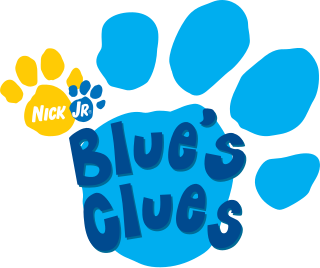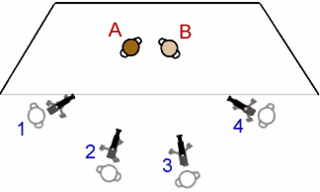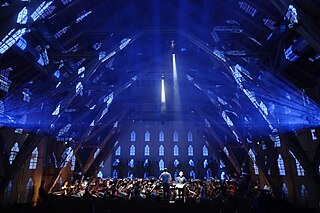
A film crew is a group of people, hired by a production company, for the purpose of producing a film or motion picture. The crew is distinguished from the cast, as the cast are understood to be the actors who appear in front of the camera or provide voices for characters in the film. The crew is also separate from the producers, as the producers are the ones who own a portion of either the film studio or the film's intellectual property rights. A film crew is divided into different departments, each of which specializes in a specific aspect of the production. Film crew positions have evolved over the years, spurred by technological change, but many traditional jobs date from the early 20th century and are common across jurisdictions and filmmaking cultures.
Sound design is the art and practice of creating soundtracks for a variety of needs. It involves specifying, acquiring or creating auditory elements using audio production techniques and tools. It is employed in a variety of disciplines including filmmaking, television production, video game development, theatre, sound recording and reproduction, live performance, sound art, post-production, radio, new media and musical instrument development. Sound design commonly involves performing and editing of previously composed or recorded audio, such as sound effects and dialogue for the purposes of the medium, but it can also involve creating sounds from scratch through synthesizers. A sound designer is one who practices sound design.

Blue's Clues is an American interactive educational children's television series, created by Angela C. Santomero, Todd Kessler, and Traci Paige Johnson, that premiered on Nickelodeon's Nick Jr. block on September 8, 1996, and concluded its run on August 6, 2006, with a total of six seasons and 143 episodes. The original host of the show was Steve Burns, who left in 2002 and was replaced by Donovan Patton for the rest of the series. The show follows an animated blue-spotted dog named Blue as she leaves a trail of clues/paw prints for the host and the viewers to figure out her plans for the day.
The role of an assistant director on a film includes tracking daily progress against the filming production schedule, arranging logistics, preparing daily call sheets, checking cast and crew, and maintaining order on the set. They also have to take care of the health and safety of the crew. The role of an assistant to the film director is often confused with assistant director but the responsibilities are entirely different. The assistant to the film director manages all of the directors in development, pre-production, while on set, through post-production and is often involved in both personnel management as well as creative aspects of the production process.

BBC Birmingham is one of the oldest regional arms of the BBC, located in Birmingham. It was the first region outside London to start broadcasting both the corporation's radio and television transmissions, the latter from the Sutton Coldfield television transmitter.
A technical director (TD) is usually a senior technical person within e.g. a software company, engineering firm, film studio, theatre company or television studio. This person usually has the highest level of skill within a specific technical field.

A television studio, also called a television production studio, is an installation room in which video productions take place, either for the production of live television and its recording onto video tape or other media such as SSDs, or for the acquisition of raw footage for post-production. The design of a studio is similar to, and derived from, movie studios, with a few amendments for the special requirements of television production. A professional television studio generally has several rooms, which are kept separate for noise and practicality reasons. These rooms are connected via 'talkback' or an intercom, and personnel will be divided among these workplaces.
Television crew positions are derived from those of film crew, but with several differences.
The set decorator is the head of the set decoration department in the film and television industry, responsible for selecting, designing, fabricating, and sourcing the "set dressing" elements of each set in a Feature Film, Television, or New Media episode or commercial, in support of the story and characters of the script. The set decorator is responsible for each décor element inside the sets, from practical lighting, technology, art, furniture, drapery, floor coverings, books, collectables, to exterior furnishings such as satellite dishes, Old West water troughs, streetlamps, traffic lights, garden furniture and sculptures.
The BAFTA TV Awards, or British Academy Television Awards, are presented in an annual award show hosted by the BAFTA. They have been awarded annually since 1955.

Location scouting is a vital process in the pre-production stage of filmmaking and commercial photography. Once scriptwriters, producers or directors have decided what general kind of scenery they require for the various parts of their work shot outside the studio, the search for a suitable place or "location" outside the studio begins. Location scouts also look for generally spectacular or interesting locations beforehand, to have a database of locations in case of requests.

The multiple-camera setup, multiple-camera mode of production, multi-camera or simply multicam is a method of filmmaking and video production. Several cameras—either film or professional video cameras—are employed on the set and simultaneously record or broadcast a scene. It is often contrasted with a single-camera setup, which uses one camera.
A storyboard artist creates storyboards for advertising agencies and film productions.
A floor manager or floor director is a member of the crew of a television show. The floor manager is responsible for giving information from the director in the control room, to the crew on the studio floor, and then back to the director.
Ted Childs is a British television producer, screenwriter, and director.

A television show, TV program, or simply a TV show, is the general reference to any content produced for viewing on a television set that is broadcast via over-the-air, satellite, or cable. This includes content made by television broadcasters and content made for broadcasting by film production companies. It excludes breaking news, advertisements, or trailers that are typically placed between shows. Television shows are most often scheduled for broadcast well ahead of time and appear on electronic guides or other TV listings, but streaming services often make them available for viewing anytime. The content in a television show is produced by one of two production methodologies: live taped shows such as variety and news magazine shows shot on a television studio stage or sporting events The other production model includes animation and a variety of film productions ranging from movies to series. Shows not produced on a television studio stage are usually contracted or licensed to be made by appropriate production companies.

Video design or projection design is a creative field of stagecraft. It is concerned with the creation and integration of film, motion graphics and live camera feed into the fields of theatre, opera, dance, fashion shows, concerts and other live events. Video design has only recently gained recognition as a separate creative field. For instance, United Scenic Artists' Local 829, the union that represents designers and scenic artists in the US entertainment industry, only added the Projection Designer membership category in 2007. Prior to this, the responsibilities of video design would often be taken on by a scenic designer or lighting designer. A person who practices the art of video design is often known as a Video Designer. However, naming conventions vary around the world, and so practitioners may also be credited as Projection Designer, "Media Designer", Cinematographer or Video Director. As a relatively new field of stagecraft, practitioners create their own definitions, rules and techniques.

A television production truck or OB van is a small mobile production control room to allow filming of events and video production at locations outside a regular television studio. They are used for remote broadcasts, outside broadcasting (OB), and electronic field production (EFP). Some require a crew of as many as 30 people, with additional trucks for additional equipment as well as a satellite truck, which transmits video back to the studio by sending it up through a communications satellite using a satellite dish, which then transmits it back down to the studio. Alternatively, some production trucks include a satellite transmitter and satellite dish for this purpose in a single truck body to save space, time and cost.
A line producer is a type of film or television producer who is the head of the production office management personnel during daily operations of a feature film, advertisement film, television film, or TV program. They are responsible for human resources and handling any problems that come up during production. Line producers also manage scheduling and the budget of a motion picture, as well as day-to-day physical aspects of the film production.

Gogglebox is a British reality television series created by Stephen Lambert, Tania Alexander and Tim Harcourt, and broadcast on Channel 4. The series documents families and groups of friends around the United Kingdom who are filmed for their observations and reactions to the previous week's television from their own homes. The first series launched on 7 March 2013, and the show returned for its twenty-second series on 8 September 2023. The show was narrated by Caroline Aherne from its launch until her death in July 2016, after which Craig Cash took over.








